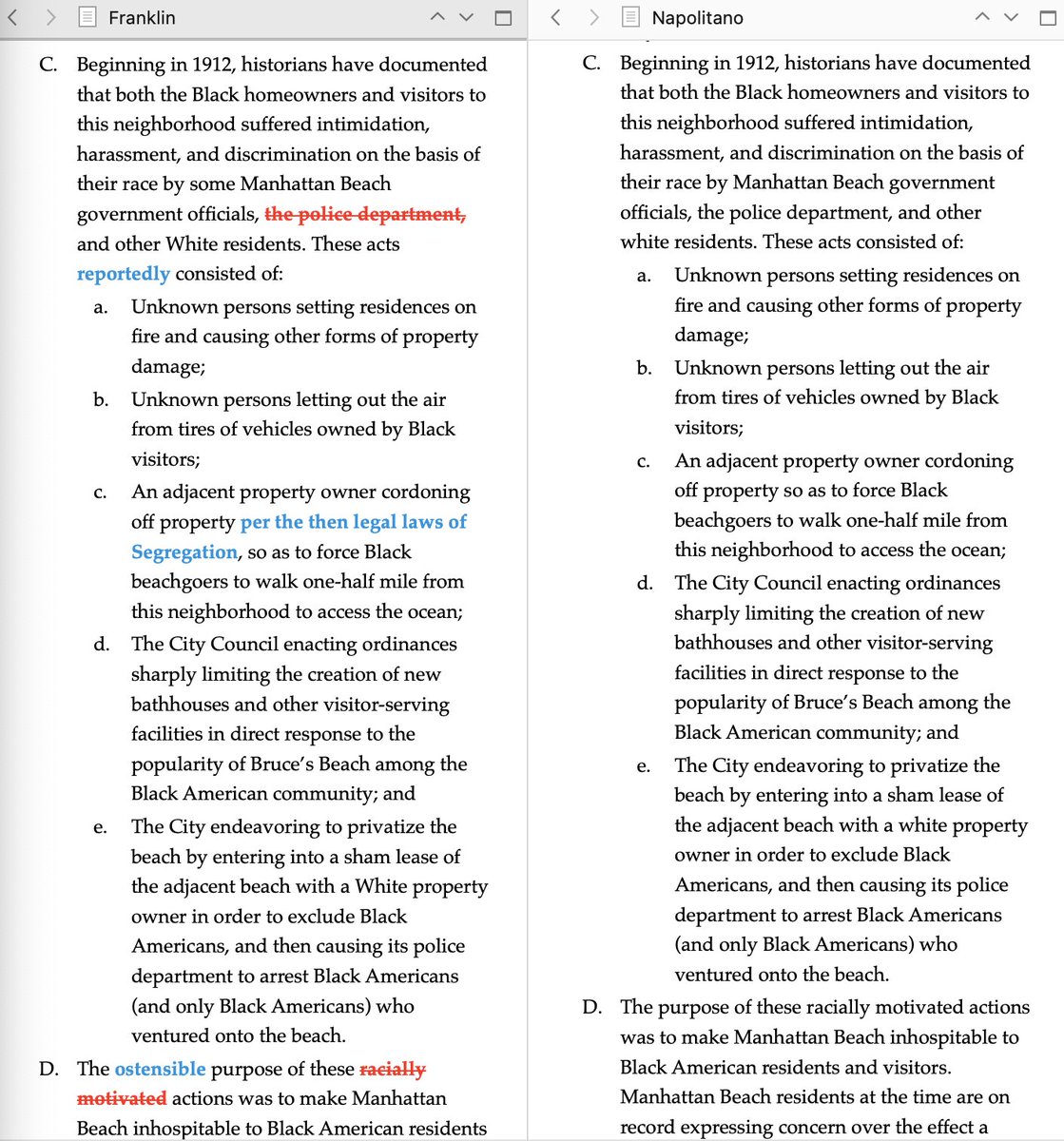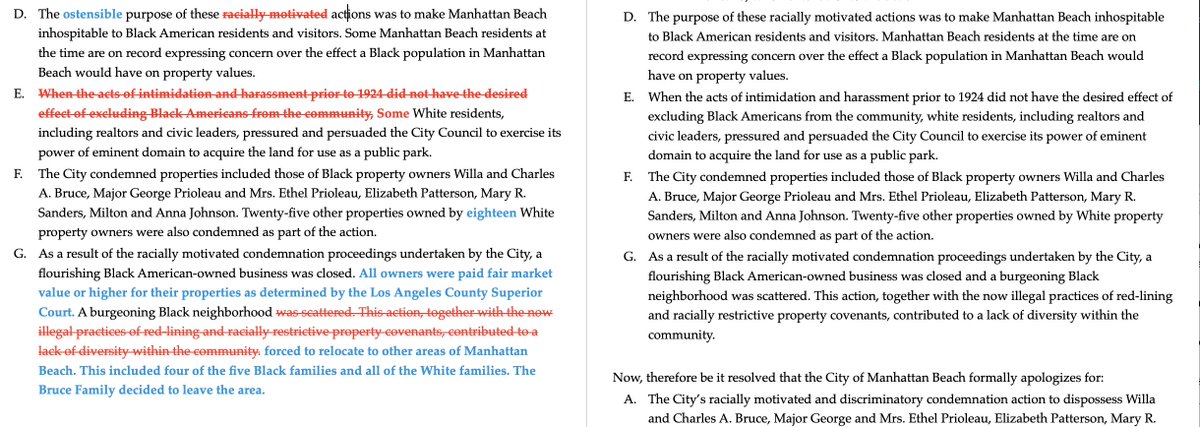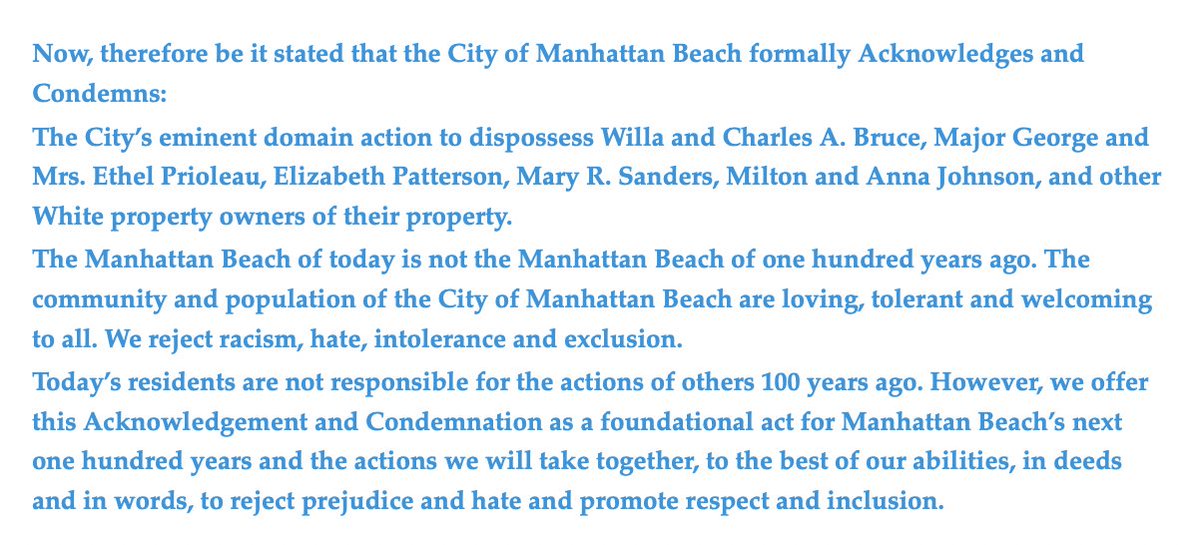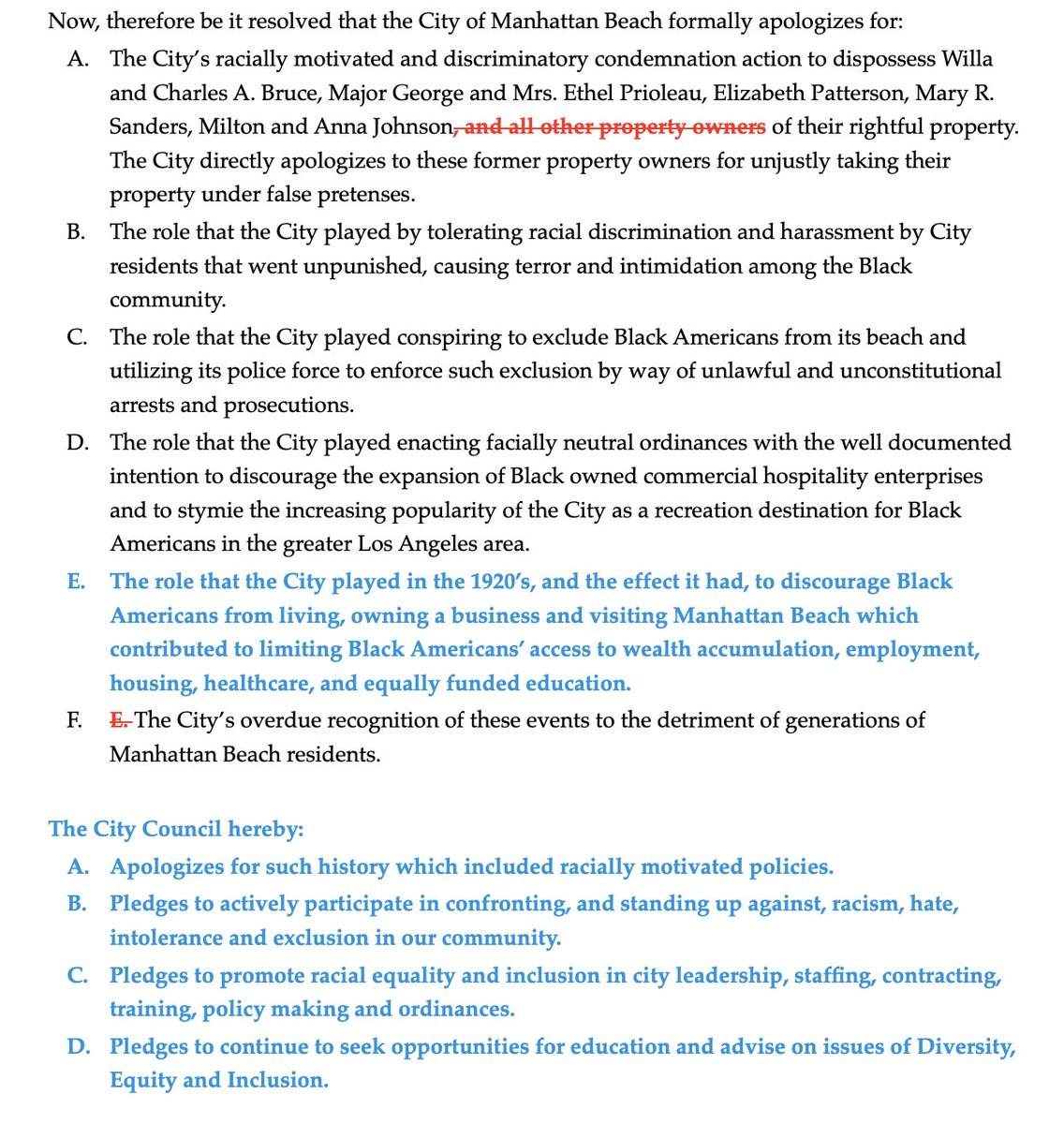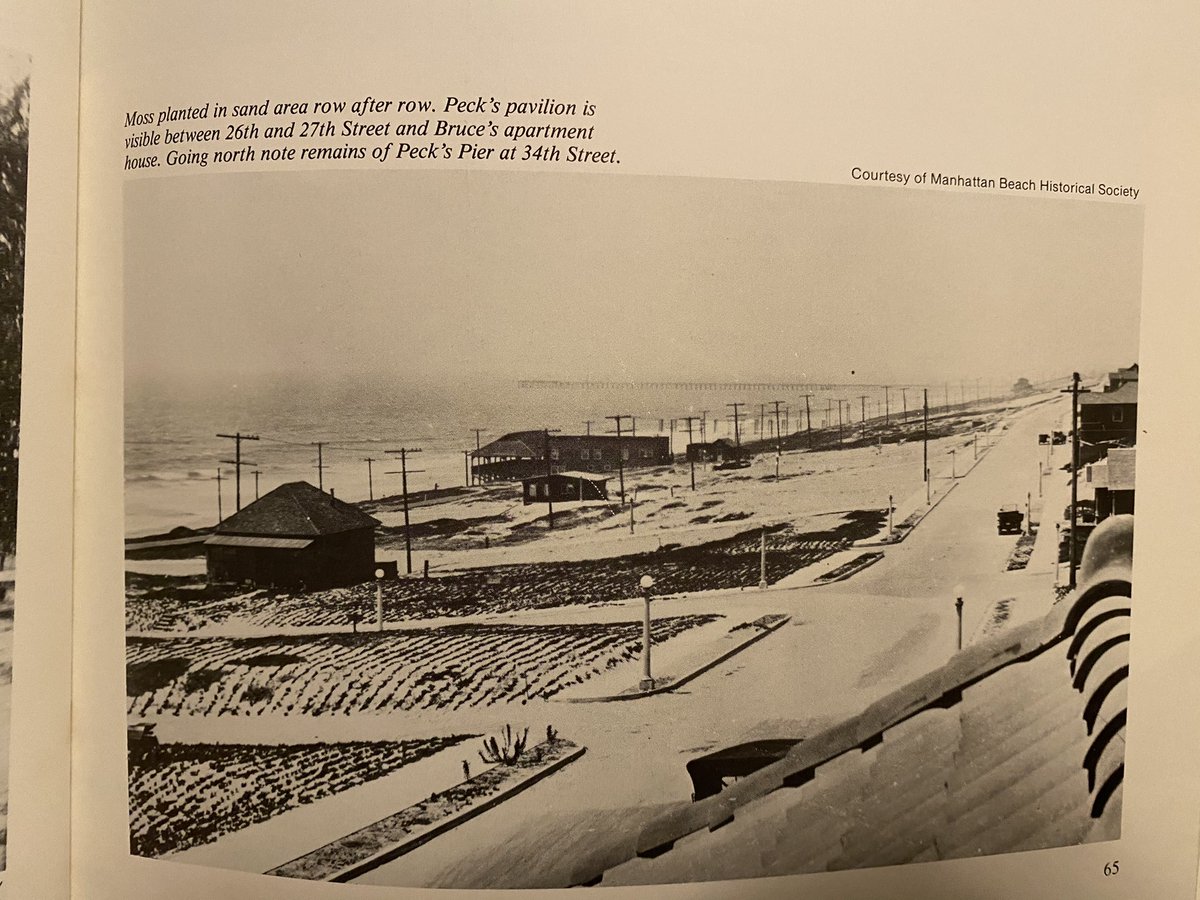Hey all, tonight the Manhattan Beach City Council will discuss whether or not to offer an apology regarding Bruce& #39;s Beach, the Black resort that MB condemned and seized via eminent domain nearly 100 years ago.
I& #39;ll be live-tweeting the proceedings — but let& #39;s pregame, shall we?
I& #39;ll be live-tweeting the proceedings — but let& #39;s pregame, shall we?
Background: In the 1910s, Willa and Charles Bruce opened up one of the few Black-friendly resorts in LA County, drawing a handful of Black families and quite a few Black visitors.
Residents didn& #39;t like that, leading to harassment, then a petition and eminent domain proceedings.
Residents didn& #39;t like that, leading to harassment, then a petition and eminent domain proceedings.
In the late 1920s, MB seized two whole blocks, displacing the Bruce family& #39;s resort and a handful of other Black landowners who had built homes on their lots.
Land was also seized from more than a dozen white landowners — however, their lots were empty.
Land was also seized from more than a dozen white landowners — however, their lots were empty.
In the proceedings, MB claimed the act was done for a park. No park was built until the 1960s.
(Check the link for a more complete background!) https://spectrumnews1.com/ca/la-west/human-interest/2020/07/31/reflections-on-race--bruce-s-beach--then-and-now">https://spectrumnews1.com/ca/la-wes...
(Check the link for a more complete background!) https://spectrumnews1.com/ca/la-west/human-interest/2020/07/31/reflections-on-race--bruce-s-beach--then-and-now">https://spectrumnews1.com/ca/la-wes...
During the swell of the racial justice movement last year, activists learned of the truth behind Bruce& #39;s Beach, and pressed city leaders to atone for MB& #39;s past misdeeds.
MB then formed the Bruce& #39;s Beach Task Force, to determine a path forward.
MB then formed the Bruce& #39;s Beach Task Force, to determine a path forward.
Last month, the Council dissolved the task force, deeming its job complete. It accepted a few recommendations (replacing the gently-phrased monument sign, adding artwork) rejected others (ongoing racial justice recommendations) — and punted on offering an apology.
More on that in my thread from that night! https://twitter.com/jdmendez/status/1371990893461266432">https://twitter.com/jdmendez/...
The apology is the hot button.
Proponents argued that it& #39;s proper to the city to admit fault for past misdeeds to move forward.
Opponents offered arguments ranging from "our city isn& #39;t racist" to "that was all in the past" to "admission of fault could lead to lawsuits"
Proponents argued that it& #39;s proper to the city to admit fault for past misdeeds to move forward.
Opponents offered arguments ranging from "our city isn& #39;t racist" to "that was all in the past" to "admission of fault could lead to lawsuits"
So tonight, four separate resolutions are being proposed: three apologies, and one "statement of acknowledgement and condemnation."
Two of the resos (an apology by Councilmember Steve Napolitano & a statement by CM Joe Franklin) are intended to reduce legal liability.
Two of the resos (an apology by Councilmember Steve Napolitano & a statement by CM Joe Franklin) are intended to reduce legal liability.
I mention those two in particular, because Franklin& #39;s largely rewrites Napolitano& #39;s — but with some of the more pointed phrasing removed.
Franklin& #39;s version casts a softer focus on the city& #39;s actions, including casting doubt to racial motivations, noting that racist practices were legal, and deleting reference to racism by police.
Here are some comparisons! (The left side is Franklin& #39;s — blue text is his additions)
Here are some comparisons! (The left side is Franklin& #39;s — blue text is his additions)
Franklin also adds a section very clearly stating that the residents of Manhattan Beach today are NOT responsible for what happened 100 years ago.
To clarify, I made these highlights and emphases in a text editor. You can see the original documents at the link attached.
https://manhattanbeach.legistar.com/LegislationDetail.aspx?ID=4898747&GUID=85D61A51-340D-48E8-9853-CC0B670061CE">https://manhattanbeach.legistar.com/Legislati...
https://manhattanbeach.legistar.com/LegislationDetail.aspx?ID=4898747&GUID=85D61A51-340D-48E8-9853-CC0B670061CE">https://manhattanbeach.legistar.com/Legislati...
The Manhattan Beach City Council meeting has started, but the council is handling some other business first. I& #39;ll check in as soon as they& #39;re up to the Bruce& #39;s Beach item.
If this meeting is like the last, I expect Bruce& #39;s Beach commentary to start with general public comment.
If this meeting is like the last, I expect Bruce& #39;s Beach commentary to start with general public comment.
In the meantime, I just finished my quick comparison of CM Hildy Stern& #39;s proposed apology to CM Napolitano& #39;s. It appears to build off of his as well, but adds greater detail and context of racist actions to his proposal.
It also adds a pointed apology. (Screenshot excerpt below)
It also adds a pointed apology. (Screenshot excerpt below)
It& #39;s worth noting that ALL of the councilmember proposals build off of the Bruce& #39;s Beach Task Force& #39;s proposed apology, which is very detailed in describing the racist actions against Black residents and visitors, and remarks upon the larger cultural legacy of racism.
The Task Force& #39;s apology also takes care to note that the city& #39;s legacy of racism has cultural effects that have "discouraged other Black families and families of color from making their home in Manhattan Beach."
The first comment has been offered! A Manhattan Beach mother is urging the council to adopt Stern& #39;s draft, and has chastised them pretty severely.
She& #39;s added that not apologizing continues to make the city appear out of touch.
She& #39;s added that not apologizing continues to make the city appear out of touch.
The first mention of a "culture war" has been uttered.
A resident said that no one today is supporting what happened 100 years ago — and he added that no one respects the wordsmithing game of an "acknowledgement."
A resident said that no one today is supporting what happened 100 years ago — and he added that no one respects the wordsmithing game of an "acknowledgement."
The first comment in opposition to an apology has been offered, quoting the rejection of an apology by former Mayor Mitch Ward (the city& #39;s first — and still only — Black mayor and council member).
The commenter also opined that the movement is backed by "opportunists" seeking $$$
The commenter also opined that the movement is backed by "opportunists" seeking $$$
A good handful of commenters so far are supporting the apology written by CM Hildy Stern. Quite a few have pointed out that apologies for past wrongdoing have been issued by other cities without lawsuits.
"One of the first lessons that parents teach their children is that when you make a mistake, you say sorry for what you did...it& #39;s just common decency," said one commenter, who supports both Stern& #39;s and Napolitano& #39;s proposals.
Justice for Bruce& #39;s Beach founder Kavon Ward is supporting Stern& #39;s apology, pointedly telling the city to "step up." She called back to a report of recent thefts from MBPD Chief Derrick Abel, urging the city to acknowledge its "history of theft" (paraphrase) from the Bruce family
Now& #39;s a good time to note that the majority of statements here are going to be paraphrases.
Also, boy, the city has a good bit of variation hitting the mute button when folks have had their two minutes of comment.
Also, boy, the city has a good bit of variation hitting the mute button when folks have had their two minutes of comment.
After a commenter has pushed back on apologies, another is backing Stern& #39;s resolution, saying that it alone provides a path forward with its pledges to promote racial equality, and to seek opportunity to educate.
"The shakedown needs to end," said one resident, who rejects the idea of apology. She said that OTHER legal experts say that an apology leads to liability.
"Choose the fiscally and legally conservative approach on behalf of city residents," she adds.
"Choose the fiscally and legally conservative approach on behalf of city residents," she adds.
"We can argue the details, but to paraphrase Justice Potter Stewart, we know racism when we see it, and that was racism," one commenter said. "An apology doesn& #39;t make any of us racist, or culpable...if we don& #39;t choose to apologize, what does it say about who we are?"
One thing I would LOVE to know, and I am having trouble researching in the middle of this meeting:
How many times has a city been sued following an apology for past wrongdoing?
Anyone have any ideas?
How many times has a city been sued following an apology for past wrongdoing?
Anyone have any ideas?
Another commenter has said that "acknowledgement is in order," saying that an apology would only give activists power to "do this to another town."
A common thread from the commenters is parenthood, that one of the first things parents teach their children is to apologize.
Makes sense — MB is a suburban city that residents believe is an exceptional place to raise families.
Makes sense — MB is a suburban city that residents believe is an exceptional place to raise families.
Another commenter has personally apologized to the Bruce family.
"An apology is a statement of empathy and regret. I urge the city council to join me," she said.
"It is not what happened in the past that makes a city racist. It& #39;s what happens in the present that counts."
"An apology is a statement of empathy and regret. I urge the city council to join me," she said.
"It is not what happened in the past that makes a city racist. It& #39;s what happens in the present that counts."
That commenter has added that a handful of states and cities have apologized for past acts — and that she haven& #39;t found any evidence of litigation related to those apologies.
A 40-year resident said that she is "deeply disturbed" that the city has not issued an apology. Her family used that park for years before knowing its history.
"Now that we know the circumstances, I personally offer a heartfelt apology, and I expect my city to do the same."
"Now that we know the circumstances, I personally offer a heartfelt apology, and I expect my city to do the same."
There have been a few folks speaking against an apology so far, but the overwhelming majority of comments I& #39;ve heard to this point are in favor of the city offering a formal apology.
Alison Rose Jefferson, a historian who deeply researched the history of Bruce& #39;s Beach, and she& #39;s urging the city to approve Stern& #39;s apology, saying that it will "aid in dismantling structural racism in the present and shape the future of the community"
One commenter said that neither an apology or an acknowledgement is appropriate. Eminent domain, she said, "happened," and added that the Black families who lost their property "were allowed" to move elsewhere within the city — a statement that& #39;s been repeated a few times.
One man has stated that the city must both apologize and make change — particularly, he said, to unjust and racist policing practices. He shared a story that he, a white man, will often get warnings when pulled over, but that people of color are often pulled to sit on the curb.
The next commenter said that he doesn& #39;t see racism in MB, that he& #39;s seen kids of ALL colors playing, and that that when people are seen sitting on the curb after being pulled over, it& #39;s because cops have flagged their license plate for a stolen car.
That man said that the Bruce family& #39;s resort was never going to work out. "To have a loud restaurant and bar in the middle of a neighborhood like that was never going to fly."
The Bruce family& #39;s resort was one of only a handful of structures built in that area at the time.
The Bruce family& #39;s resort was one of only a handful of structures built in that area at the time.
One commenter has recalled the racist verbal attack against two Black surfers in Manhattan Beach a few weeks ago, saying that racism is "alive and well" in MB.
One woman is recalling the bigotry her Jewish family experienced during her childhood—and noted that the abuse only ended when a Black family moved in, drawing hatred themselves.
If bigotry or racism has never happened to you, I& #39;m glad, she said, adding that if it had, you would want to know when the city is making an effort to make right.
I’ll catch up with the coverage in a moment here, but I wanted to dig up a photo of the area in question from the late 1910s-20s. This photo comes from MB’s longtime historian Jan Dennis’s “A Walk Beside the Sea.”
"The way that racism works is that you don& #39;t have to see it," one woman said, addressing white commenters who said they don& #39;t see racism. "So for a city like MB that has such a small percentage of residents who are Black, of course it will be something that you don& #39;t see."
One man said that OF COURSE Manhattan Beach shouldn& #39;t apologize.
"There is no systemic racism! I& #39;ve talked to my Black friends who are STILL in South Central...I& #39;ve been here a long time," he said, adding that he doesn& #39;t see racism when he& #39;s out at Ralph& #39;s.
"There is no systemic racism! I& #39;ve talked to my Black friends who are STILL in South Central...I& #39;ve been here a long time," he said, adding that he doesn& #39;t see racism when he& #39;s out at Ralph& #39;s.
That...was an all-timer, as far as public comments go.
A woman who said she moved here from Detroit said that the people on the Bruce& #39;s Beach Task Force are trying to make money off the city. She named three people — only one of whom was actually on the Task Force.
"They need to work hard, like the citizens of Manhattan Beach."
"They need to work hard, like the citizens of Manhattan Beach."
She closed her comment, saying that she "loves this town" and wants "justice for all."
One woman is bringing up anti-Latino racism, saying that the definition of "white" has changed over the decades.
"The truth is that all cultures and heritage have been subject to racism," she said. "This generation is not responsible for sins of the past."
"The truth is that all cultures and heritage have been subject to racism," she said. "This generation is not responsible for sins of the past."
And now she& #39;s talking about businesses being shut down because of the pandemic, and "those of a certain political ideology."
"If you want to have a diversity quota, maybe the NBA, MLB, everyone else should have a quota."
"If you want to have a diversity quota, maybe the NBA, MLB, everyone else should have a quota."
The Council has cut off public comment, and is taking a 10 minute break. They& #39;ll move to discussion after.
Which leads me to wonder — any Brown Act experts in the house tonight? I& #39;ve got a quick question.
The Manhattan Beach City Council has returned from recess, and they& #39;re back on Bruce& #39;s Beach.
Starting with comment from CM Steve Napolitano, and liability about an apology.
Starting with comment from CM Steve Napolitano, and liability about an apology.
Napolitano and City Attorney Quinn Barrow were...pretty opaque about the issue of liability.
Both Barrow & Napolitano said that they will not waive attorney/client privilege, regarding discussions about liability. But they said that a local news article from DigMB was "accurate."
Both Barrow & Napolitano said that they will not waive attorney/client privilege, regarding discussions about liability. But they said that a local news article from DigMB was "accurate."
Napolitano is reading from a story written by a long-ago MB councilmember and published in the long-defunct Redondo Reflex.
The column was titled "The Negro Problem," and describes the Eminent Domain.
"I always felt that was a mean trick...but I supposed I had to," the man wrote.
The column was titled "The Negro Problem," and describes the Eminent Domain.
"I always felt that was a mean trick...but I supposed I had to," the man wrote.
Napolitano said he supports an apology. "No, I& #39;m not some far-left pinko commie," he said. "There are plenty of examples of apologies at all levels of government...I have offered up an apology that has been determined to pose no liability to the city."
The point is, Napolitano said, the story of Bruce& #39;s Beach has been a crack in the foundation of MB& #39;s community, and an apology can heal.
He called Franklin& #39;s acknowledgement a "non-apology," and a "middle-ground."
He added that he& #39;s not married to his reso, and is open to editing
He called Franklin& #39;s acknowledgement a "non-apology," and a "middle-ground."
He added that he& #39;s not married to his reso, and is open to editing
CM Stern is now pointing out the limiting language in CM Franklin& #39;s statement, and said that it actually justifies actions at the time.
"A vote to support it is a vote to support racially-motivated processes...and ignore the reality of our history," she said.
"A vote to support it is a vote to support racially-motivated processes...and ignore the reality of our history," she said.
"It is not true, and it has been proved out time and again in other jurisdictions" that resolutions of apology do not lead to lawsuits, Stern said, citing Glendale& #39;s recent apology for its history as a "sundown town."
Here& #39;s what she& #39;s talking about, regarding Glendale. https://spectrumnews1.com/ca/la-west/news/2020/10/09/glendale-becomes-first-ca-city-to-recognize-history-as-sundown-town-">https://spectrumnews1.com/ca/la-wes...
Stern criticized the people who have minimized the stories of racism by people of color in MB, and also criticized Mayor Hadley and CM Franklin for reading emails minimizing the existence of racism in the community.
"I want to state this very clearly: I am in no way saying that MB is a racist city, and I haven& #39;t heard the city who have shared these experiences say that either," Stern said, trying to get out in front of the "Concerned Citizens of MB."
"This is an opportunity to do something that has meaning, that has decency," Stern said. "An apology is a win for everyone, and most notably, for those who have felt helpless and unprotected for so long."
got distracted as CM Franklin spoke, but he defended the idea that MB could be sued for issuing an apology. He also added that the city needs an "accurate and unbiased history" of Bruce& #39;s Beach.
Franklin then moved that his "statement of acknowledgement and condemnation" be approved.
I didn& #39;t hear a second — yet. The council moved onto comment from CM Richard Montgomery.
I didn& #39;t hear a second — yet. The council moved onto comment from CM Richard Montgomery.
Montgomery is recounting a story from within the last year wherein he was threatened that, if the city did not offer reparations, MB would face a protest.
"What happened in 1924 was and remains the darkest moment in the city& #39;s history," Montgomery said.
He& #39;s diving into the background leading up to tonight. "If we& #39;re going to be accurate, be accurate to everyone!"
He& #39;s diving into the background leading up to tonight. "If we& #39;re going to be accurate, be accurate to everyone!"
"In my opinion, the Task Force went off course by sending a reso of apology to the council," Montgomery said. He said he& #39;s gotten more than 1,000 emails about Bruce& #39;s Beach.
"I don& #39;t vote based on emails or phone calls. But talking to residents, and the general consensus by far was acknowledgement," Montgomery said.
The "silent majority," he said, are afraid of speaking out.
The "silent majority," he said, are afraid of speaking out.
Montgomery has gone into the definition of "apology," about "remembering the wrong, and expressing regret."
Mayor Hadley is now speaking, and she said that she& #39;s going in without prepared remarks because "the supposedly free and fair press" pulled out her comment about "the Scarlet R" of racism.
"I would have behaved differently if I was a co-chair, so I do lay this at the feet of our two council co-chairs," Hadley said, apparently throwing her colleagues under the bus.
She said that respected historian Jan Dennis approved of the task force& #39;s history. Hadley then asked if the history was complete, and Dennis replied that "history is never complete."
"This, to me, is about a word...the word & #39;semantics& #39; comes to mind, and that& #39;s the difference between an apology and an acknowledgement," Hadley said. "I& #39;m a mom, I& #39;m a Christian, I& #39;ve been married 28 years, I& #39;ve apologized plenty."
But "apology" she said, carries a "lot of baggage" in California law.
"That word is a club that we can be handing people to beat us with," she said.
"That word is a club that we can be handing people to beat us with," she said.
Hadley acknowledged that there& #39;s little risk of being sued, but still risk.
She& #39;s now comparing the situation to buying a car for a child. "Would you put your 16 year old in a car without an airbag? I say issuing an apology from a city with deep pockets...is a risk too far."
She& #39;s now comparing the situation to buying a car for a child. "Would you put your 16 year old in a car without an airbag? I say issuing an apology from a city with deep pockets...is a risk too far."
"I wouldn& #39;t be a good councilmember to willfully and blindly ignore those threats," Hadley said, describing alleged legal threats against the city. "I& #39;m protecting you, the tax-payer, some of whom are still struggling" after the pandemic.
"It would be robbing you and me to pay for the sins of 100 years ago," Hadley said. "For expensive and foreseeable litigation would be paid out of city services," she added.
The vote she& #39;s going to make, Hadley said, is about risk. It& #39;s not about "caring."
She& #39;s taking offense at Stern& #39;s comment, and her "divisive rhetoric."
"I have Steve talking about dialogue and understanding...but please do not make this about caring," she said to Stern.
She& #39;s taking offense at Stern& #39;s comment, and her "divisive rhetoric."
"I have Steve talking about dialogue and understanding...but please do not make this about caring," she said to Stern.
She brought up her son, who is serving in the military to "defend your right to free speech."
Hadley is now saying that no one picked up her comments about the Uyematsu family.
She doesn& #39;t read me, apparently. https://twitter.com/jdmendez/status/1372063327648583682">https://twitter.com/jdmendez/...
She doesn& #39;t read me, apparently. https://twitter.com/jdmendez/status/1372063327648583682">https://twitter.com/jdmendez/...
Napolitano has jumped in to say "this isn& #39;t about whataboutism...this is about what the city did," he said. the school board bought the land.
"Shutting down litigation? You haven& #39;t shut down anything," he added.
"Shutting down litigation? You haven& #39;t shut down anything," he added.
Napolitano has pushed back on her criticism of the Task Force, saying that she& #39;s playing Monday Morning Quarterback by choosing to not talk about the apology until now.
Napolitano knows which way the wind is blowing, and is asking for edits to Franklin& #39;s statement.
"If it was just about condemnation (of the property), we wouldn& #39;t be talking about this...we& #39;re condemning that this was racially motivated," Napolitano said.
"If it was just about condemnation (of the property), we wouldn& #39;t be talking about this...we& #39;re condemning that this was racially motivated," Napolitano said.
Essentially, Napolitano wants to make clear that the city was racially motivated in its eminent domain of the Bruce family& #39;s land, and strike a sentence about the land owners all being paid fair market value. "You& #39;re saying that, they were paid, so it& #39;s OK."
Franklin agreed to the edit, but demurred to striking the statement, saying that "well, we& #39;re going to have to vote."
Stern& #39;s up for a comment.
Stern& #39;s up for a comment.
"To continue on a path, to exaggerate that a reso of apology is going to disallow us to have CIP projects, this snowballing of exaggeration causes fear in our community," Stern said.
She added that there& #39;s no indication that apology opens the city to increased risk of litigation.
She added that there& #39;s no indication that apology opens the city to increased risk of litigation.
Hadley: "Where would the money come from to pay for litigation?"
Napolitano: "Insurance. You make the point that all this is going to go away if we get sued, and that& #39;s not true. Creating more fear is not the answer either."
Napolitano: "Insurance. You make the point that all this is going to go away if we get sued, and that& #39;s not true. Creating more fear is not the answer either."
Stern: "Apparently we& #39;ve been threatened with some type of litigation. I haven& #39;t seen it." A threat, supposedly came well before the Task Force was even conceived. "Somehow, you& #39;re assigning that now to some action that we take today."
Stern reiterates that there& #39;s no precedent for litigation based on a lawsuit, but that she& #39;s more than happy to see her reso of apology edited, so it can be acceptable and still have meaning for the community.
Montgomery: Some residents feel we& #39;re obligated to apologize. I see this as an opportunity for all of us to come together to acknowledge the pain that was caused, and show that we as a city deeply regret the city& #39;s actions.
He& #39;s adding that Franklin& #39;s apology is missing "empathy"
He& #39;s adding that Franklin& #39;s apology is missing "empathy"
Very specifically the word, not that it doesn& #39;t express empathy.
Though, one could argue...
Though, one could argue...
Montgomery has seconded the motion Franklin made, with Napolitano& #39;s edit, as well as including that the city "empathizes" in its condemnation of the eminent domain.
Hadley added that she finds that the resolution would be hollow without including the word "empathy."
Stern is seeking to strike other minimizing language within Franklin& #39;s reso, including his use of the word "reportedly."
Franklin: "We& #39;re still getting information in."
He& #39;s, again, demurring — in this case, because he hasn& #39;t gotten a formal history report.
Franklin: "We& #39;re still getting information in."
He& #39;s, again, demurring — in this case, because he hasn& #39;t gotten a formal history report.
Stern is continuing to take issue with Franklin& #39;s reso.
"It doesn& #39;t sound like you& #39;re really ready to submit an acknowledgement if you don& #39;t have confidence in the facts," Stern said.
"It doesn& #39;t sound like you& #39;re really ready to submit an acknowledgement if you don& #39;t have confidence in the facts," Stern said.
Franklin: "I& #39;m comfortable to have presented it tonight. We spent a lot of time on it. I gave a lot of it a lot of thought, and I stand by it."
Napolitano: "If possible, what about a motion to approve in concept and bring it back? It can be further refined."
Napolitano: "If possible, what about a motion to approve in concept and bring it back? It can be further refined."
Montgomery: "We want to make sure we have that right to revise...if we get credible information, we can revise then."
Hadley: "I don& #39;t think I want to revise the acknowledgement. This is our point in time reckoning with our past so we can move forward."
Hadley: "I don& #39;t think I want to revise the acknowledgement. This is our point in time reckoning with our past so we can move forward."
Napolitano: "Any member who votes for this can bring it back in the future."
Franklin: "We were all ready to have something accepted."
Franklin: "We were all ready to have something accepted."
Stern is trying to strike more language, and being overridden by Hadley. Hadley is forcing the vote.
The vote is 4-1 in favor of Franklin& #39;s "acknowledgement of condemnation and acknowledgement."
Stern said she found this to be incredibly disturbing.
Stern said she found this to be incredibly disturbing.
A handful of changes have been made to Franklin& #39;s reso, including the addition of the word "empathizes," and a line acknowledging that the eminent domain was "racially motivated."
Public comment is continuing! A person is saying that she finds it reprehensible that the councilmembers voted with their feelings.
"That you guys care more about lawsuits than you do for the people who are concerned citizens... It is your job to listen to your residents."
"That you guys care more about lawsuits than you do for the people who are concerned citizens... It is your job to listen to your residents."
"Mayor Hadley, you used a false and bogus legal claim when you& #39;ve got two lawyers sitting beside you on council," one commenter said. She praised Stern, chided Napolitano for voting in favor, and tore into Montgomery. Franklin was ignored.
One thing about Napolitano& #39;s vote: At the risk of reading his words too deeply, he seemed to signal that he was voting in favor to reserve the right to bring the acknowledgement statement back — in case the facts that the reso is founded upon change.

 Read on Twitter
Read on Twitter